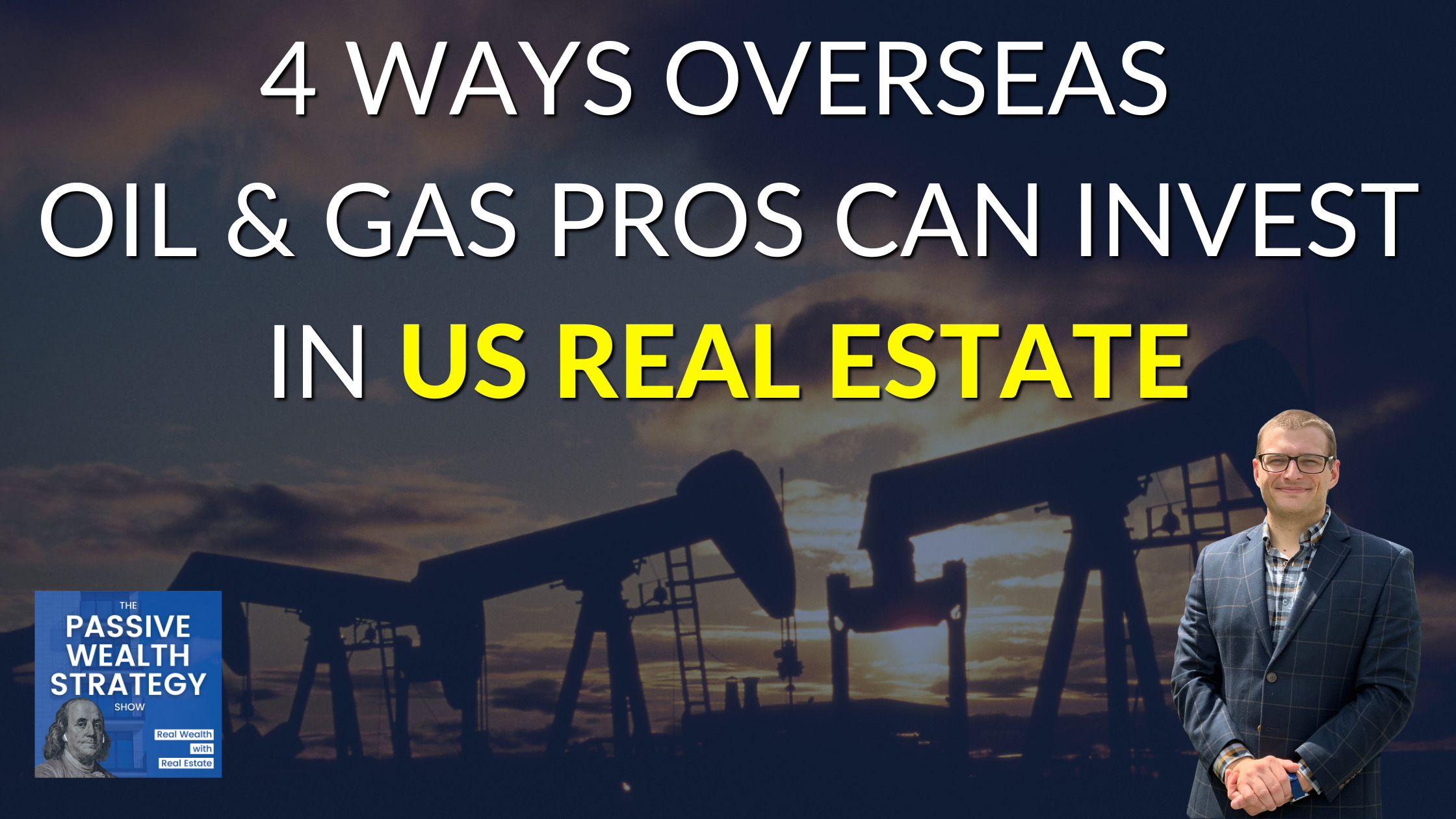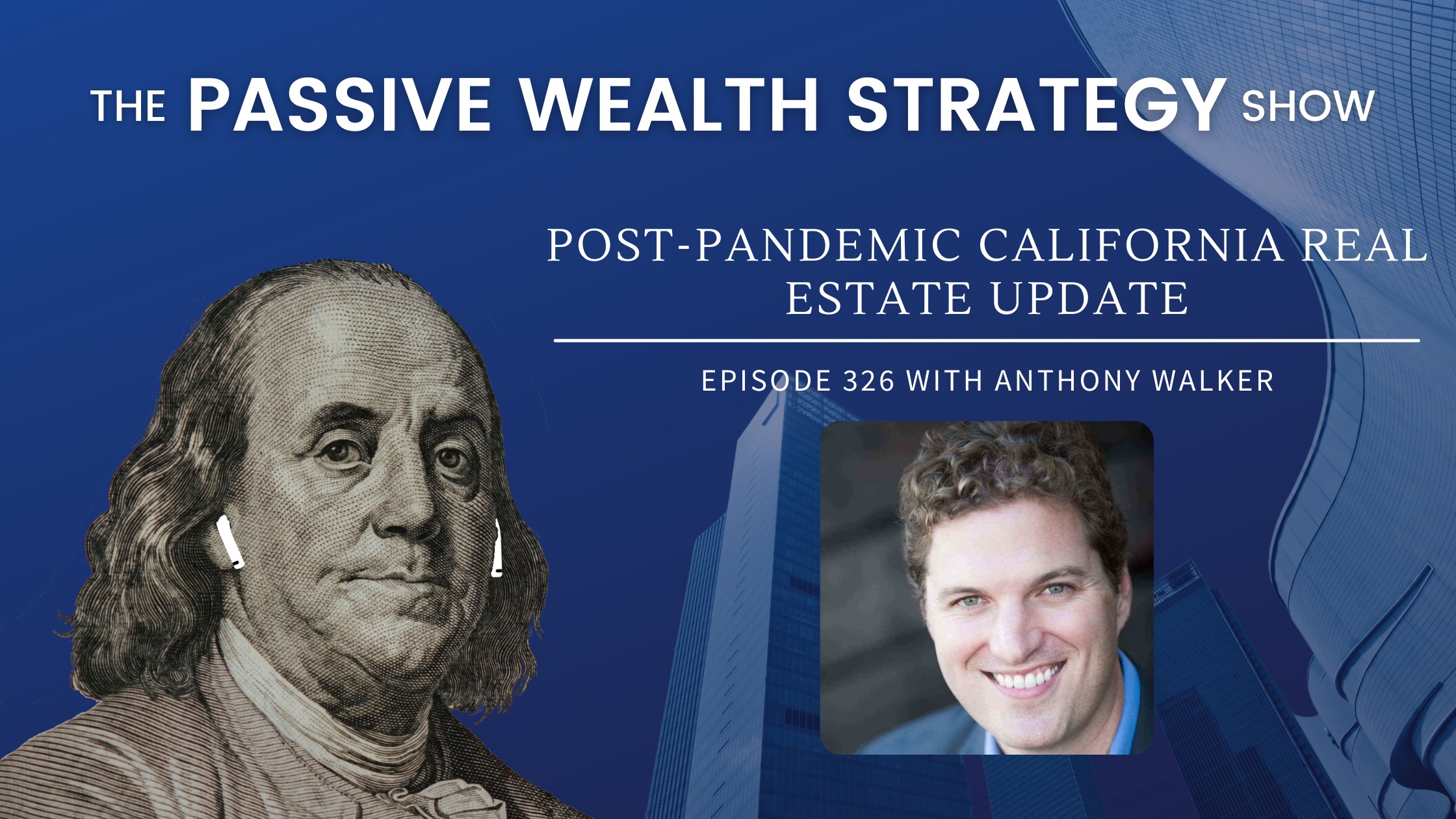
Post-pandemic California Real Estate Update with Anthony Walker
Anthony. Thank you for joining us coming back on.
Absolutely. I’m excited to be here, Taylor.
It’s going to be a great conversation. I’m looking forward to learning. What’s changed in your world as a result of COVID. I have a very specialized market. I think folks are really interested in hearing what’s happened for our listeners who didn’t catch your original interview on the show.
Can you tell us about, know, yourself and what you do, and then we’ll dive into it. The update, please?
Sure, absolutely. Yeah. Like most areas, lots of changes in the last year and a half. This would be really interesting timing. I think the first time I came on was actually in March of 2020, something like that.
When, right when it all broke out. So yeah, if you didn’t see my previous episode my name is Anthony Walker. I’m the CEO and managing broker of a Los Angeles area multifamily. Investment brokerage company by the name of Buckingham investments. We help individuals, small partnerships, syndicators make sense of investing mostly in apartment buildings right here in the Southern California market.
Which is, I know going against the grain for a lot of people that are in this space. So it’s always an interesting conversation to come on these things. I’ve been doing this myself now for about 12 years and I invest individually too. So I own a portfolio of apartments. I’m up to about 120 units personally right here in our area.
I have a lot on the long beach but spread throughout the greater south bay of the LA area. And we do business all over LA county and some in orange county as well. Our company does probably about 150 to 200 million. A year in sales, and that’s mostly from everywhere from individual investors getting started buying a duplex owner, occupying house, hacking up to, syndicators or, higher net worth people that are buying, 20, 30 unit properties, that type of things doing exchanges and all of that jazz.
We’re in it. Everyone here at the company is an investor, as well as a broker. So we’ve experienced what it’s like to be an owner over the last 18. What’s happened to the market. We also do our own local market research. So I’m sure we’ll talk a little bit about that. And what’s happened here locally and in the property markets, it’s been around.
Yeah,
absolutely. So it’s, it is crazy to think back about when we recorded that interview, we were just getting hit with, all the lockdowns and everything. Started to figure out what’s going to happen, I don’t even remember if eviction moratoriums were on the table at that point or not, but, they were certainly coming, and that kind of led me to.
One of my biggest questions is okay, so California, New York, and, a few of these areas are, we’re already unfriendly to landlords and then add on you. Can’t evict people who haven’t paid for little. Did we know, year and a half or longer? I don’t know if, whether that’s carrying on there.
What happened there? How bad of an impact was it? How did you deal with it and what do you think moving forward?
It’s been a moving target here, all along. As with pretty much everything with the pandemic. When it first broke out, we all thought, oh yeah, in three weeks, we’re going to be back to LA to these little lockdowns.
Yeah. It’ll be fine. Don’t worry guys. Obviously, that didn’t happen. And we got the eviction moratoria and all this stuff, so yeah. California is a very tenant-friendly state. We definitely have an eviction moratorium that was put in place at the state level, as well as a variety of different programs at the different city levels too.
So, depending on what city you’re investing in here, the rules are different. Today’s a good time because the state-level eviction moratorium here in California expires today, this is the last day. Good timing for our interview. It’s been extended, I think. Three times two or three times initially, just as we continue to see what was happening in the health situation.
And the rule was the tenants had to claim financial hardship as a result of COVID. They had to pay 25% of the contract rent in order to qualify for that. So they did have to pay something and then, you could not evict them in or file for eviction until the moratorium was over. And then at that point, Rent during that covered period would be relegated to consumer debt.
So you could still pursue them through the regular collections process, like a credit card bill or something like that, but you couldn’t use it as a basis for an unlawful detainer action and any victim, but starting tomorrow if October rent is not paid. You can file an eviction. Now that went hand in hand, everyone freaked out.
Of course, at first, when that came out, everyone was very worried. Understandably. So there was tons of uncertainty about whether tenants were going to be able to pay rent. There was mortgage forbearance available too. So the thought was, I think from the powers that be is that we can trickle everything up.
We give the tenants relief, we give the landlords relief, there were some funds available through the idol loans. The VA, if you had an active income business, you could get DPP funding, but that generally didn’t apply to, rental property owners. But along the way, then they also become, federal funds available for rent relief too.
In the beginning, we had a couple of states. Senate bills that as part of the eviction moratorium established, how landlords would be made whole. And so you could get 80% of the rent that was unpaid from the government and the landlord would basically apply in conjunction with the tenants. And then that would be paid directly to the landlords.
Once they pass. The wrap of the stimulus package, then that became a hundred percent. So currently if the tenant’s supply and the landlords, cooperate with them, or rather the tenants cooperate with the landlord you can get a hundred percent of that on paid rent delivered to you from the government.
So that’s pretty great. Tenants have really not been displaced. It’s been impossible, to evict people, but at the same time, landlords are being made whole, but there’s a long delay there. You may apply and it may be a couple of months before you get your check. And then if the tenant continues to not pay, you have to apply again.
And so on and so forth. The net effect of that was that everything just was status quo really for almost the entire last year and a half. There were a surprisingly few tenants on a percentage basis that just decided to take advantage of that. Whether they were really considered whether they were really experiencing financial hardship or not, we may never know.
But I, in our property management partners, I would say somewhere along with the 5% range, maybe 10% range of At any given time of tenants were claiming hardship and not paying some of the rent. We had been tracking collections through that portfolio basically every month of the pandemic.
And we never got below 93% collections in any given month. Wow. No matter where the different, Senate bills or eviction moratoria or packages were going, it never got that bad. That wave of foreclosures. Everybody was predicting at the beginning from landlords that we’re going to be able to make their mortgage payments.
Certainly never materialized. And honestly, the level of distress in the tenants was pretty isolated. For the most part, it went surprisingly well, even without considering relief funds from the government and stuff like that. So now that we’re at the end of this, these relief checks are coming in, people by and large have done.
Okay. We’ve had a handful of clients that. Taking advantage of mortgage forbearance, and that’s worked out, although that can definitely impact you down the line, even though it’s not supposed to with refinances and new debt, it can. And so it’s been weird, but I think. All things considered.
If you told me at the beginning that this is where we would be we escaped pretty unscathed.
That’s good. We definitely had some tenants whether they were taking advantage or not, or experiencing hardship, I’m sure some of them genuinely were experiencing that hardship and, some were probably taking advantage.
It’s going to be next, but I wonder about that. You mentioned that there was a 25% that they, the tenant had to pay in order to qualify, but. I mean in a lot of areas, courts weren’t even considering eviction cases for a really long time and they already had a backlog and all of that. Was there any recourse, even if they didn’t pay that 25%, like in, in a real-world, practical, sense.
It was difficult. Yeah. The courts got really jammed up. People were trying to get cases through that had started pre-pandemic. Everything went to zoom, their calendars got all extended. But there were a few cases where we got there. I actually had one tenant in one of my buildings that didn’t pay anything for basically 10 months.
And they got we filed the paperwork, they went to the hearing and they didn’t respond and they lost and they were going to. Evicted. And finally, they came back to us at the 11th hour and said wait, we’ll pay everything and go completely current. If we could stay in our unit and Blau, of course, I agreed to do that.
So it did end up working. It took forever. It took a really long time. But it turns out that, putting your head in the sand is not an effective method.
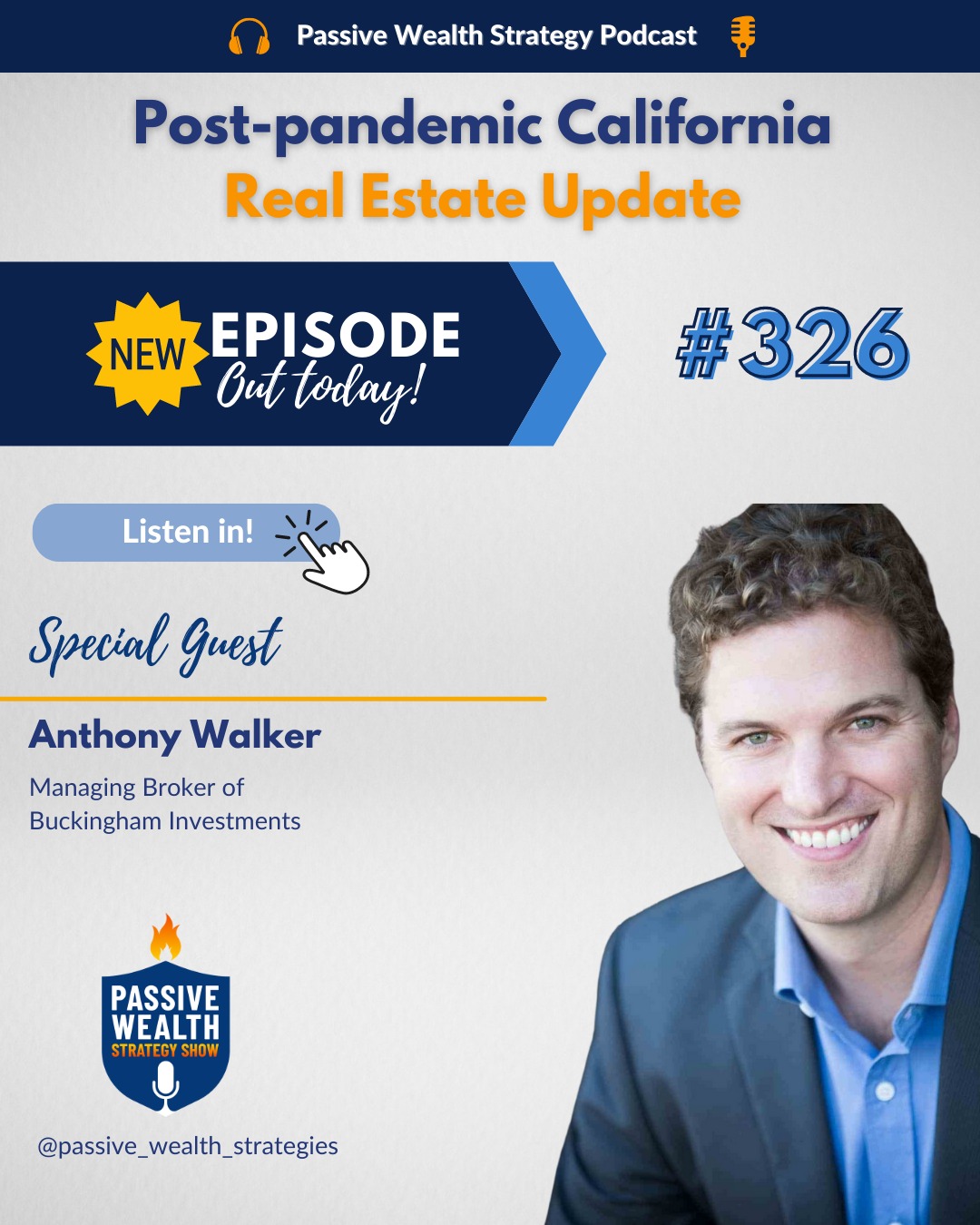
Post-pandemic California Real Estate Update with Anthony Walker
Yeah. No matter what it is. So one of the things you mentioned was that the, a wave of foreclosures that many, I would say probably myself included many of the.
Really expected to happen, whether it was mom and pop landlords, that couldn’t make their bills because they can’t last 10 months was unpaid rent. Even if it’s coming on the back end and they need their money coming in the door to make sure the bills. Or, the say eviction wave that was, forecast that isn’t going to happen either, but that kind of leads to a conversation about the overall inventory.
And if available, say properties or units or single families or whatever available for purchase in the market, I’ll just say in my area and enrichment versus. Inventory is still really low. There’s not a lot out there available to buy. And when stuff goes on the market, man it’s purchased right away for pretty.
Attractive pricing from the seller’s point of view. How about, in, in Southern California, how’s the situation there with available inventory and sales? What do you see?
Or so, it’s an interesting case study a little bit. I went and unpacked our research for the. 18 months or so, and look back just to the end of 2019 to get a sense of where we’ve come.
And inventory is very low. Inventory is ridiculously low right now. If you go and open up the MLS, look at CoStar, or wherever you get your deals from there are very few properties to choose from. I think right now I like looking at long beach. If you look at five and available listings in long beach, I think today there were like 18 of them available, which is a pretty big city.
There should be like 50. And so it’s really tight. On the other hand, though, when I look at the sales volume charts we are way above 2019 quarterly sales transactions here in 2021. So it’s an interesting story. There’s a ton of demand and there’s not very much inventory. There is enough demand that what’s happening is as things come on the market, it just gets snapped up super fast.
So on any given day, if you open up the market and look, there’s not much to see, but that doesn’t mean that there are no transactions happening. There’s a lot of stuff that’s just selling and coming off the market almost immediately in the first week, there’s a lot of stuff that is trading off-market, of course.
And as a result, I think. When I look at our kind of localized market here, we had somewhere in the low two hundred per quarter in transaction volume at the end of 2019. And we’re in the three hundred right now in 2021. So it’s way up, but inventory is really low. So to your point, it’s definitely a seller’s market.
Prices are up considerably. The single-family market here is absolutely nuts. Everybody wants to place. And its super expensive interest rates are at all times low all the time lows. So that’s definitely stoking those flames in the multifamily space. I went and looked back and did a little year-over-year comparison, right before we jumped on right now on a price per square foot basis.
Q four of 20 19 2. Right now we’re up 15%. Which is great right year and a half 15% appreciation. That’s strong. That’s not the same as stratospheric ridiculous levels that you see in the single-family markets though, in a lot of parts of the country and including our area. If you go from Q end to Q1, beginning of Q2, 2020 to where we are now, though, we’re up 30%.
So what happened is you had this deep V right there at the beginning of the pandemic where everybody freaked out, there was a lot of uncertainty. You had a little bit of panic selling going on. And anecdotally speaking, I could say as a participant in the market here, there was probably about six to eight weeks where new contracts were being made at an extreme discount when people were really afraid.
And there was just a couple of deals to be had at that time, there were a lot of lenders that had gotten over. It’s able to though. Looking backward, we might look at that, oh, I really just miss my opportunity. But the reality is it was tough to get deals done, even when we got a few done during that time period, and, at very attractive prices for the buyers, but the financing options were tricky.
Then, obviously, that came back, aggressively rates went down into the threes or even the twos and the residential space. And, there’s so much cheap, easy money out there that, the predictable thing has played out.
Yeah. That’s, I, in my opinion, I’ve spoken about this before that I think is one of the advantages of real estate is relative illiquidity.
The market sucks. Things are going, very poorly. It looks like there’s a bleak outlook. We don’t have the ability to click three buttons and liquidate our entire portfolio is at a loss like we could with any, wall street products where we can sell immediately, because at least in that case, and in many cases, that initial panic, it ends up not being quite as bad as, we think it could be.
And here we are, we’re much higher than we were back then during that initial period where everybody was afraid.
Abs I say that all the time. Forcing you to sit back and calm down for a minute because you can’t take quick action with real estate has probably done a lot of people, a lot of favors over the years.
I totally agree. There were very few crashes, 2008, obviously the outlier where you could really make a case for selling high and buying low and have had that workout. I think if you unpack the math and consider the tax consequences of selling and then getting back in it like it’s just, it’s a great long-term game.
And I think it’s a testament to how resilient the United States real estate market is in general and how comfortable we can be as investors that if you don’t over-leverage yourself and you buy appropriately your deals, pencil that you’re going to do well over the long run.
Absolutely. Now one last aspect that I wanted to touch on was those rents.
We’ve seen rents going up and in many markets, how about in, Southern California, where. I shoot. Do you guys have rent controls or any of that? I don’t know other regulations there, but I would assume they probably could just continue to March on upward, maybe even faster than the actual price of the properties have gone.
So that’s definitely something to keep your eye on. Yeah. Rents here. Market rents for new leases are way higher now than they were in the middle of the deeper parts of the pandemic. I’ve noticed this even only in the last six months. It’s gotten much more pronounced. We’re seeing rents on new leases being signed at Denver’s.
That would have been unbelievable to me two years ago in 2019. And now they’re just crazy. So they went down a little bit right in the middle of the pandemic. Because nobody really knew what was happening. And, but not very much. And then they started rising again and then really just this year they’ve exploded.
And I think what happened is that, a lot of the. Policies that were put in place were designed to keep a lot of people in their homes and they did. People, you don’t want to move in the middle of the pandemic, right? You just want to hunker down and you want to do your thing, but there are a lot of people that did want to go get some more space for themselves, have their own place, have a place where they can work from home, expand into a bigger unit.
So on and so forth. There’s a lot of money out there. So while you constrain the supply of rentals, because. You’re not getting evictions. And some people are choosing to stay in place. You’re also creating a lot of demand for the space by people that do want to get their own place. And so that’s created this know.
Super high rent growth that we’re seeing in the market right now, there is rent control here in the whole state. We have a pretty mild version of it that allows annual rent increases of 5%, plus the change in a consumer price index. With inflation being where it is right now, this year is increased.
The rate is 8.6%. Next year. It might be 10, 10 is the maximum under that program. So CPI continues to run over 5%. April to April, we’re going to have a 10% allowable increase here next year, which is plenty for landlords to catch up to the market. It’s a pretty fair program. But I, again, city by city, that varies.
So like the city of Los Angeles itself is currently under absolute rent. No rent can increase it at all. And so nobody’s moving, which then locks up the existing supply and makes new rentals that much more expensive rent control. As it turns out, it doesn’t really work affordable housing accessible.
It keeps people in their houses though. I suppose it’s, it’s good for avoiding displacement, but so we’re definitely seeing that right now. There’s some new build. There’s not enough. It’s really difficult to build. New projects right now because of all the permitting and planning issues that we have going on in our cities.
But combinations of, yeah, we’ve got eviction moratorium. There’s a couple of red freezes around. There’s not in a lot of the markets that we work with. But the net effect of that is that you’re seeing really strong rents on.
Nice. So I think the big multi-million dollar question is we’ve heard so much about like the Exodus, the supposedly exit us from California to Texas and other markets.
You here in Virginia, we’ve seen folks coming up from parts of Florida and just buying up, some of the nice real estates, at least in the city of Richmond. I can give this awesome house in the best part of town for so much less than, Miami or whatever. So I screwed it. I’ll do it.
I’ll move up to Virginia. How about out there? Are you seeing a lot of folks moving out and it sounds like there’s still strong demand, so maybe there’s more being made out of that trend than is really there?
I think so it’s a, it’s a. It’s a fun headline to point at especially for people raising funds from California investors to place in the middle of the country markets.
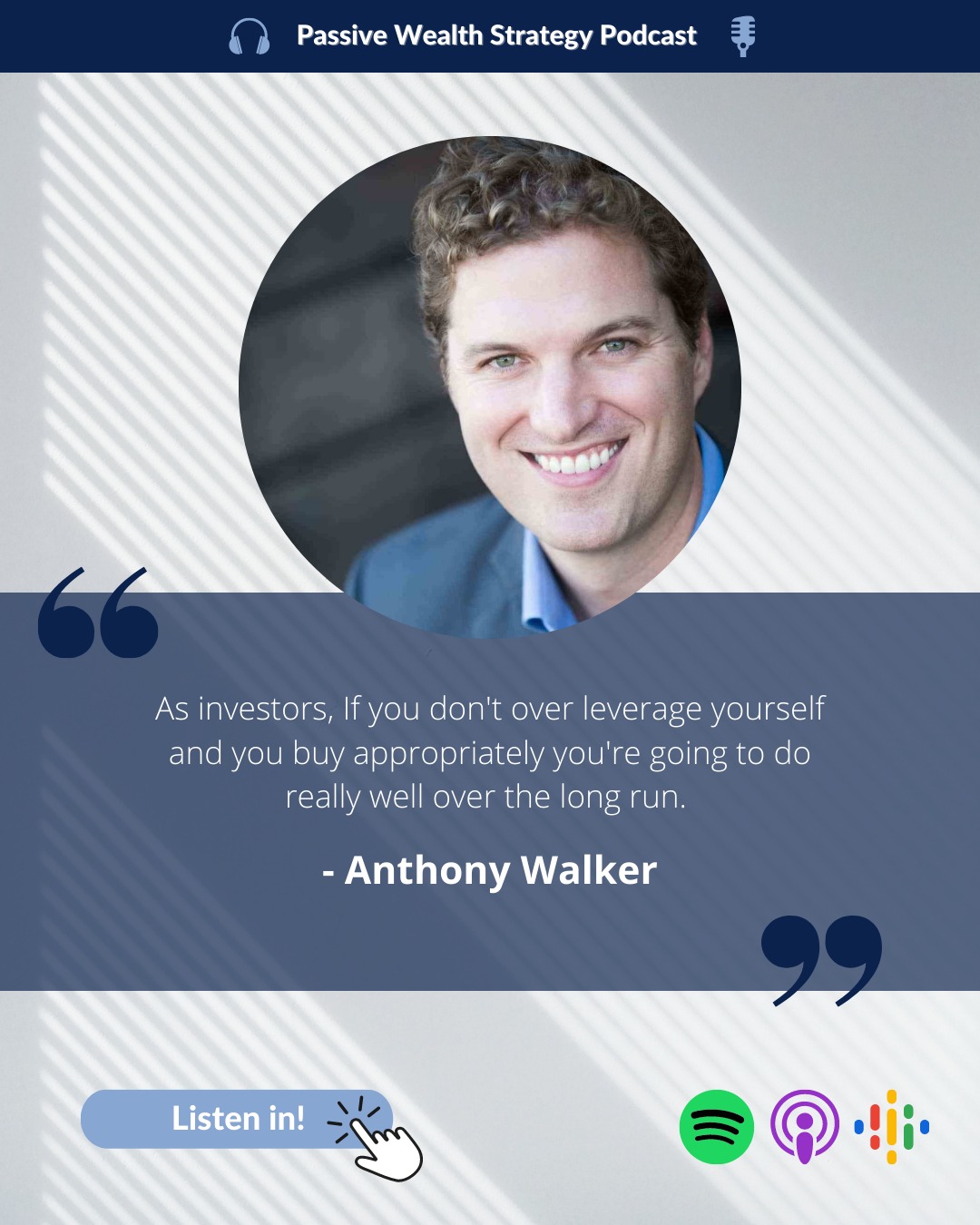
As investors, If you don't over leverage yourself and you buy appropriately you're going to do really well over the long run.
Anthony Walker Tweet
It’s a really popular thing to point at. If you actually look at the data. Yeah. There, there is actually a fair amount of out-migration happening to these other states. I’ve I personally know people that have got. And that’s happened. But it’s happened generally on the lower ends of the income bracket here.
So they get back to our rental question, right? Whereas render affordability gets more and more difficult, the same thing with, purchase affordability for single-family homes. It’s tempting to go to other markets and certainly people have done that, but, we still have an incredibly strong job base here of companies that need super, highly skilled.
Highly-paid workers. And so on a net basis, like the population loss out of the LA area is very small. It’s, maybe 50,000 people or something on a net basis. And they’re going like this with the lower income brackets coming out and then the higher income people coming in. Yeah, you read headlines about companies moving operations for tax reasons and regulatory reasons.
And that’s, that makes sense. And you should pay attention to that. But when we see that happen locally, those companies headquarters are almost immediately absorbed by, major institutional investors that are redone, redo redoing these campuses and leasing them out to, new creative businesses and tech companies and startups and stuff like that.
So it’s not that you’re not driving down the major streets here and seeing just vacancy after vacancy. Certainly, that’s the case with, a handful of restaurants and there’s been some turnover in hospitality, properties, stuff like that as to be expected from the pandemic.
No. I think a lot of that is overblown and certainly, being a participant here in the demand, you cannot deny that there’s so much demand that it doesn’t even matter a week. I could afford to lose quite a few more people from my market and I’d be pretty happy to be an operator here, to be honest, that’s perfectly okay with me.
So it’s a funny one. I think the work from home thing is maybe a little bit. Over-exaggerated as well. We’re back in the office, we took the opportunity to upgrade to a larger space. That’s where I am today. I think our last interview was from my house and now I’m in our larger headquarters.
We’ve got the COVID special. There’s a lot of changeover happening in business tenants and an office. But it’s not. The apocalypse that, people are thinking maybe Northern California is a different story. From what I’ve heard. It is, the tech companies up there are much more open to virtual work.
Maybe they’re rethinking their footprint in their real estate needs and how expensive it is to lease class office space and have these highly amenitized campuses. But down here in LA, it’s more fragmented. I think our economy is a bit more diverse as far as the industries that are represented.
Smaller companies. There are some big ones here too. Of course. But the demand is absolutely here.
No, that’s good to hear. Love it. Appreciate the update right now. We’re going to take a quick break for ours. All right, Anthony, as I’ve got three questions. I ask every guest on the show, but you’ve been on the show before we’ve covered those questions.
I’ve got three different ones for our returning guests. Are you ready to go? I’m ready. All right. Great. First one. What is your favorite? Personal book, a favorite book to read for personal
reasons.
I’m going to go with a fiction book. I probably an unpopular choice, at least sorts of things, but I love the book dune GiffordI just, I love Saifai good.
Saifai I’m such a fan imagining. The future and other worlds, space travel, and technology are just so cool to me. So I’m really excited for the new dude movie that’s coming out too, but that’s definitely my favorite personal book
I’ve ever read. Yeah, absolutely. It’s a great one. I read that probably about 10 years ago and the meeting to circle back up.
That really is one of the grades I five books. It is. So had your favorite personal book, really? I think now we’re going to get to the one that the type of answer, the type of questions you’d expect to be asked on this show. What is your favorite business?
There are so many good ones, but then, the one that sticks in my head that I have to constantly think about every day as I’m working on my business is the E-Myth.
Ah just love that book. I thought the analogy of the pie shop just sticks with me. It’s so perfect. If you can systematize and put a process in place for everything it takes to make and sell a pie. You could probably do that for any business. And so I’m constantly trying to think what I can do here with my business to automate and to write down processes and figure out what we can do to expand.
I think there’s so much value in that book that, those concepts have been discussed in a lot of other books too, but that one really sticks in my head because of the great analogy.
I agree. I think he really explained it well and put it in our minds. I think of how we can build systems. And I like to think about it as focusing on a higher dollar per hour type of task.
So we’re working on the business, the high-value things. Exactly. Last question. Where’s the next place you’re traveling after COVID is all over. And the dust settles. Things are back to normal.
We’re going to go skiing as I always like to ski in the season, but that’s a pretty easy COVID trip too.
So that’s a cop-out answer. For my wife’s benefit though, we had scheduled a cruise for her 40th birthday and we scheduled the cruise-in, I think March or April when COVID first broke out, we were like, oh, that’s an August. This would be way over by them and will be fine to cruise. So we had paid for a cruise for our 40th birthday in 2020.
And here we are. So I owe my wife a cruise. We’re going to go do that. I dunno if we’re going to the Caribbean or the bed it’s raining. We’ll see if that schedules, but it’d be really nice to do that again.
Here we are approaching two years, rather than two weeks. This little stop, this bread approaching two years later and you’re going to need to make up the, her on that.
Yeah. Thank you for joining us today. Coming back on the show, it’s been great reconnecting with you and getting an update about Southern California real estate. If folks want to reach out, if they want to get in touch with you, if they want to learn more about you, what you can provide, or any of that great kind of stuff, where can they track you down?
Absolutely. Thanks for having. You can check out tons of our educational content, including some of that local market research I was talking about buckinghaminvestments.com, or feel free to shoot me an email. Personally, I’m at [email protected] or you can probably find me on LinkedIn and connect to that way.
Awesome. Thank you once again for coming back on the show, it’s been great talking with you. To everybody out there. Thank you for tuning in. If you’re enjoying the show, please leave us a rating or review on the apple podcast. Five stars. If you don’t mind. I appreciate that so much that helps other people learn about the show because that helps us rank higher in the apple podcast ecosystem.
And I’m always honest with you guys that gives me a little warm and fuzzy feeling because I get to see that you’re engaging with the content and you’re escaping the wall street casino. With us. If you know anyone who could use a little bit more passive wealth in their lives, please share the show with them and bring them into the tribe.
Don’t forget to subscribe. We’ll catch you here every Monday, Tuesday, and Thursday, spreading just real estate investing knowledge from our expert guests. Just like Anthony. Thank you for tuning in once again. I hope you have a great rest of your day and we’ll talk to you on the next one. Bye-bye.
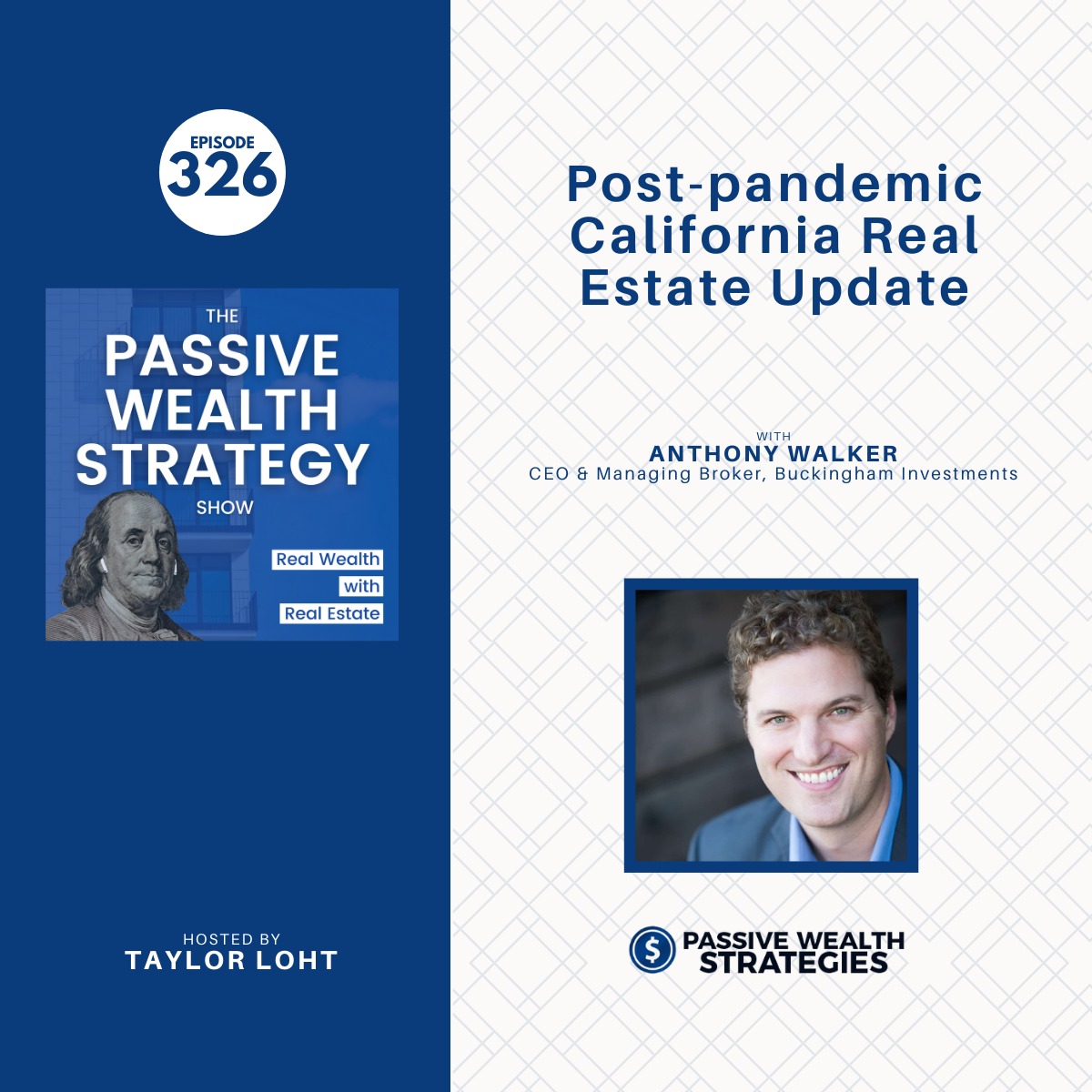
Anthony Walker Back on The Passive Wealth Strategy Show
About our Guest

Anthony Walker
Anthony is a managing broker of Buckingham Investments. Just as Buckingham Investments has been doing for over 50 years, Anthony seeks to be a trusted advisor and assist his clients with achieving financial independence and retirement security through investing in multi-family income property. He believes that real estate wealth is not created only at the time of purchase, but well before an investment is ever made through education and planning.
He teaches frequent seminars on many aspects of investing and has been an invited guest speaker at multiple educational institutions and trade organizations throughout Southern California. Practicing the investment philosophy he teaches, Anthony has also developed an extensive portfolio of income property, the vast majority of which is located in the local Greater South Bay of Los Angeles.
Anthony received his Bachelor of Arts from The University of Southern California and his Masters of Business Administration from Loyola Marymount University. He lives in the oceanside neighborhood of The Hollywood Riviera in the South Bay, where he enjoys playing Rock music, riding motorcycles, and a myriad of Southern California sports
Episode Show Notes
Anthony is a managing broker of Buckingham Investments. Just as Buckingham Investments has been doing for over 50 years, Anthony seeks to be a trusted advisor and assist his clients with achieving financial independence and retirement security through investing in multi-family income property. He believes that real estate wealth is not created only at the time of purchase, but well before an investment is ever made through education and planning.
[00:01 – 05:52] Opening Segment
- Let’s welcome back my guest
- Get to know Anthony Walker
- Anthony shares his career and their company
[05:53 – 11:38] Post-pandemic California Real Estate Update
- A moving target and eviction moratoria
- “California is a very tenant-friendly state.”
- How to get 100% of unpaid rent delivered to you by the government
- Tenants and landlords working together
[11:39 – 25:19] Rents, Demands, and Supplies
- Tenants that didn’t pay at least 25% of their rent in the pandemic
- Inventory and sales
- A ton of demand but not much of supply
- Sitting back and calming down from real estate has done favors
- The resiliency of the United States’ real estate market
- South California Rents
- The exodus from California to Texas and other markets
- How work from home may be a bit over-exaggerated
[25:20 – 33:52] Closing Segment
- Quick break for our sponsors
- Groundfloor offers short-term, high-yield real estate debt investments to the general public. Check www.passivewealthstrategy.com/groundfloor/ to get started.
- What is your favorite book to read for personal reasons?
- What is your favorite book to read for business purposes?
- Anthony’s Travel Bucket List
- Skiing
- Cruising in the Caribbean/Mediterranean
- Connect with my guest. See the links below.
Tweetable Quotes:
“Inventory is very low. Inventories are ridiculously low right now.” – Anthony Walker
“Rent control, as it turns out, doesn’t really work.” – Anthony Walker
“Being a participant here in the demand, you cannot deny that there’s so much demand that it doesn’t even matter.” – Anthony Walker
————
Connect with Anthony Walker through [email protected], Facebook, Twitter, and LinkedIn. Visit their website https://www.buckinghaminvestments.com/.
Invest passively in multiple commercial real estate assets such as apartments, self storage, medical facilities, hotels and more through https://www.passivewealthstrategy.com/crowdstreet/
Participate directly in real estate investment loans on a fractional basis. Go to www.passivewealthstrategy.com/groundfloor/ and get ready to invest on your own terms.
Join our Passive Investor Club for access to passive commercial real estate investment opportunities.
LEAVE A REVIEW + help someone who wants to explode their business growth by sharing this episode or click here to listen to our previous episodes







